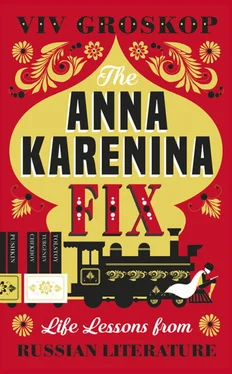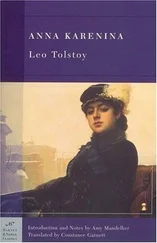Viv Groskop - The Anna Karenina Fix - Life Lessons from Russian Literature
Здесь есть возможность читать онлайн «Viv Groskop - The Anna Karenina Fix - Life Lessons from Russian Literature» весь текст электронной книги совершенно бесплатно (целиком полную версию без сокращений). В некоторых случаях можно слушать аудио, скачать через торрент в формате fb2 и присутствует краткое содержание. Город: London, Год выпуска: 2017, ISBN: 2017, Издательство: Fig Tree, Жанр: Публицистика, Критика, на английском языке. Описание произведения, (предисловие) а так же отзывы посетителей доступны на портале библиотеки ЛибКат.
- Название:The Anna Karenina Fix: Life Lessons from Russian Literature
- Автор:
- Издательство:Fig Tree
- Жанр:
- Год:2017
- Город:London
- ISBN:978-0-241-98126-9
- Рейтинг книги:3 / 5. Голосов: 1
-
Избранное:Добавить в избранное
- Отзывы:
-
Ваша оценка:
- 60
- 1
- 2
- 3
- 4
- 5
The Anna Karenina Fix: Life Lessons from Russian Literature: краткое содержание, описание и аннотация
Предлагаем к чтению аннотацию, описание, краткое содержание или предисловие (зависит от того, что написал сам автор книги «The Anna Karenina Fix: Life Lessons from Russian Literature»). Если вы не нашли необходимую информацию о книге — напишите в комментариях, мы постараемся отыскать её.
‘A passionate, hilarious, joyful love letter to Russian literature’ Allison Pearson, Sunday Telegraph
‘A delightful primer and companion to all the authors you are ashamed to admit you haven’t read’ The Times
The Anna Karenina Fix: Life Lessons from Russian Literature — читать онлайн бесплатно полную книгу (весь текст) целиком
Ниже представлен текст книги, разбитый по страницам. Система сохранения места последней прочитанной страницы, позволяет с удобством читать онлайн бесплатно книгу «The Anna Karenina Fix: Life Lessons from Russian Literature», без необходимости каждый раз заново искать на чём Вы остановились. Поставьте закладку, и сможете в любой момент перейти на страницу, на которой закончили чтение.
Интервал:
Закладка:
Gogol had a bizarre childhood and perhaps an overly close relationship with his mother. She, at least, was a fervent supporter of his, although possibly too fervent. She believed him to be the best Russian author ever. Not an unreasonable thing if your son is a successful, published novelist. (‘Pushkin who?’) But she also believed that Gogol had invented the steamboat and the railway. It’s good to have a supportive parent, but really. He hadn’t even invented the Gogol Mogol, let alone the steamboat and the railway. One of Gogol’s biographers, David Magarshack, writes, somewhat mournfully, I like to think: ‘She pampered him as a child and was mainly responsible for his becoming a capricious egotist.’ (Don’t sit on the fence! Poor Gogol.)
Gogol is surely the most openly neurotic of all the Russian writers. He was fond of telling people that he had been to see a doctor in Paris who had told him that his stomach was upside down. This was a man for whom hypochondria became ‘a way of life’, as another biographer, Richard Peace, puts it. He almost enjoyed being ill, because it meant he could move from one European spa town to the next, always looking for some kind of self-improvement and never having to return to Russia. He often wrote to his friends about his ailments in great detail. From a letter in 1832: ‘My health is exactly as it was when we met, except that my diarrhoea has stopped and I now have a tendency towards constipation.’
He did a lot of things towards the end of his life that made him very unpopular. When there was a gala performance of The Government Inspector in a theatre, he insisted on sitting on the floor in his box so that no one could see him. Presumably, from this position, he couldn’t really see the play. When the curtain came down and people called for the author of the piece to take a bow, he crawled out of the box and ran out of the theatre and down the street. This was probably because of shyness and embarrassment, but when people heard what had happened they took it for immense arrogance.
He wrote a lot of unintentionally entertaining things in his letters from abroad: ‘There is such a large number of vile faces in Russia, that I could not bear to look at them. Even now I feel like spitting when I remember them.’ He can hardly be blamed for wanting to stay abroad for years at a time. He always seemed to find himself lovely friends, often ones who would lend him money, or at least take him out for excellent meals. In Baden Baden (where else?) at one point, he becomes friendly with a princess who makes a point of always serving him a special compote. (Not a euphemism.) The ‘deceptions’ of his later life were usually about the clash of his high living with his vows of asceticism. On the one hand, he wanted to party hard. On the other, he wanted to tell everyone that he was writing the world’s greatest moral literary masterpiece and that he himself was a great moral and spiritual leader. He would write to his friends that he was living ‘like a monk’ and then go out for dinners that gave him the worst indigestion. It was around this time that he became obsessed with the aforementioned Barbra Streisand drink.
Peace gives a fantastic rundown of all his terrible qualities: ‘his obsession with illness; his apparent asexuality; his flight from passion or from stagnation with constant travel; the strange treatment of his friends; his many deceptions…’ (And this is a relatively sympathetic biographer.) The strange treatment of his friends refers to the latter part of his life, when Gogol started to follow a peculiar religious path which meant that nothing he could do was quite spiritual enough. And he began to force himself to renounce his previous works as ‘sinful’. (Sound familiar? Hello, Tolstoy.) He took a great deal of pleasure in finding fault with himself as part of this spiritual quest and wrote endless letters to his friends, begging them to list all his deficiencies. He found this practice so fruitful that he began to write back to his friends, listing all their deficiencies in return, even though they had not asked him to do this. Oh, Gogol! In later life, he fell under the influence of a mystic who succeeded in convincing him that all his work was a sin. He burned most of Part 2 of Dead Souls , instantly regretted it and died nine days later, having refused all food.
I often wonder whether Gogol was just born a century too early. He was eccentric in a way that would have been regarded as odd in any era. (He once ordered a new wig as a treatment for writer’s block, contradicting Solzhenitsyn’s later statement that Russian writers never suffered from this problem. Gogol hoped the wig would ‘open up the pores of [his] scalp’.) But a lot of his passions were connected to his sexuality: there is now a theory that he was almost certainly gay, at a time when he probably found it impossible to love another man, even privately. We don’t know for certain. Intriguingly, there is a gap in his correspondence with one close friend, Danilevsky, that suggests that something happened between them. Maybe it was something wonderful but it just couldn’t last. Or maybe it was a horrific moment when Gogol offended his friend in some way. We can’t know. I do hope he knew some kind of love. He did later write that he really enjoyed playing billiards with Danilevsky and that the sound of billiard balls clacking together was one of the things in the world that made him happiest.
Gogol had something of a twentieth-century manner about him in the way that he saw the world, which is almost reminiscent of Salvador Dalí. In a letter from Rome in 1838, he wrote about the spring roses: ‘I know you won’t believe me, but I am often overcome by a mad desire to be turned into one enormous nose – to have nothing else, no eyes, no hands, no feet, except one huge nose with nostrils the size of large buckets so that I could inhale as much of the fragrance of spring as possible.’ I hope, wherever he is, he is wearing a giant nose costume and playing billiards with his best friend.
What is satisfying about this theory of his sexuality is that it does explain a lot about Gogol: to our modern eyes, he seems to have been unnecessarily tortured. Dostoevsky’s pains were very much ones that he brought on himself with his often terrible character, his gambling and his inability to face his demons (and, most likely, the not very advanced treatment of his epilepsy). Tolstoy’s suffering was largely caused by his obsession with morality. Some of Gogol’s suffering was self-inflicted, but I also have a lot of sympathy for the theory that he couldn’t express his sexuality. This must have been torture for a man who considered a lack of hypocrisy as one of life’s greatest virtues. He longed to impart this very modern lesson to others: be yourself, don’t pretend to be something you’re not, accept yourself for who you are – but he was unable to live it out himself.
11. How to Know What Matters in Life: War and Peace by Lev Tolstoy
(Or: Don’t try to kill Napoleon)
‘We thought it was the end of the world, but it turned out for the best.’
After the shock of realizing that my Russian adventure had all been a sham, a fiction I had dreamed up in my own imagination to make myself feel more exotic or to feel like I belonged somewhere, I came to develop a more fluid attitude towards my identity. It doesn’t have to be perfect, and it doesn’t have to be fixed. It’s not something that is gifted to you, whether by birth or by ancestry. It’s not something you are. It’s something you do. That’s the most important lesson: it’s all just a ride. You might as well enjoy the view and count your blessings.
And while Russia may not be a part of my blood heritage, it’s a part of the life I have lived, and that can never be changed. Russian is not something that I will ever master, regardless of what my roots are, but it is something that can bring me great joy from the attempt at mastery alone. I will never give up on the language, and I will never give up on trying to understand these books. I never really needed to pretend to be Russian to get into them in the first place. That was just a story I told myself. I hope I would have found them anyway, in the way that any other normal person gravitates towards these books, because they are the ones that have stood the test of time. Now, I can enjoy them like any other reader, instead of having the pressure of thinking, ‘Ah, yes, these are my people…’ Which they never were in the first place.
Читать дальшеИнтервал:
Закладка:
Похожие книги на «The Anna Karenina Fix: Life Lessons from Russian Literature»
Представляем Вашему вниманию похожие книги на «The Anna Karenina Fix: Life Lessons from Russian Literature» списком для выбора. Мы отобрали схожую по названию и смыслу литературу в надежде предоставить читателям больше вариантов отыскать новые, интересные, ещё непрочитанные произведения.
Обсуждение, отзывы о книге «The Anna Karenina Fix: Life Lessons from Russian Literature» и просто собственные мнения читателей. Оставьте ваши комментарии, напишите, что Вы думаете о произведении, его смысле или главных героях. Укажите что конкретно понравилось, а что нет, и почему Вы так считаете.












